Mostrar el registro sencillo del ítem
dc.contributor.author
Vega, M. C. V.
dc.contributor.author
Bolmaro, Raul Eduardo

dc.contributor.author
Ferrante, M.
dc.contributor.author
Sordi, V. L.
dc.contributor.author
Kliauga, A. M.
dc.date.available
2018-06-27T01:05:00Z
dc.date.issued
2015-10
dc.identifier.citation
Vega, M. C. V.; Bolmaro, Raul Eduardo; Ferrante, M.; Sordi, V. L.; Kliauga, A. M.; The influence of deformation path on strain characteristics of AA1050 aluminium processed by equal-channel angular pressing followed by rolling; Elsevier Science Sa; Materials Science and Engineering A: Structural Materials: Properties, Microstructure and Processing; 646; 10-2015; 154-162
dc.identifier.issn
0921-5093
dc.identifier.uri
http://hdl.handle.net/11336/50250
dc.description.abstract
The present investigation reports on the microstructure evolution, texture development, the nature of the grain boundaries and the tensile and deep drawing behaviour of commercial AA1050 Al processed by Equal Channel Angular Pressing (ECAP) plus rolling. Although in terms of final mechanical strength ECAP and rolling are indistinguishable, the deformation path is substantially different, and this has important consequences on both microstructure and texture. From the spatial distribution of high angle grain boundaries (HAGB) and low angle grain boundaries (LAGB), the fine microstructure and the crystallographic texture, it was concluded that the microstructure is oriented according to the external imposed flow: a spin movement in the ECAP process, which promotes the rotation of the cells inside the original grain, followed by a sliding movement caused by the rolling, leading to grain elongation. The ECAP process is more suitable to promote a higher fraction of HAGBs, and the same time as it reduces the intensity of the bulk crystallographic texture. As a consequence an increase of the penetration depth and deformation strain, as measured by the Erichsen test, was observed in samples processed by 8 ECAP passes, characterized by low texture intensity and a high degree of dynamic recrystallization.
dc.format
application/pdf
dc.language.iso
eng
dc.publisher
Elsevier Science Sa

dc.rights
info:eu-repo/semantics/openAccess
dc.rights.uri
https://creativecommons.org/licenses/by-nc-sa/2.5/ar/
dc.subject
Aluminium
dc.subject
Ecap
dc.subject
Rolling
dc.subject
Severe Plastic Deformation
dc.subject
Texture
dc.subject.classification
Ingeniería de los Materiales

dc.subject.classification
Ingeniería de los Materiales

dc.subject.classification
INGENIERÍAS Y TECNOLOGÍAS

dc.title
The influence of deformation path on strain characteristics of AA1050 aluminium processed by equal-channel angular pressing followed by rolling
dc.type
info:eu-repo/semantics/article
dc.type
info:ar-repo/semantics/artículo
dc.type
info:eu-repo/semantics/publishedVersion
dc.date.updated
2018-06-26T13:42:18Z
dc.journal.volume
646
dc.journal.pagination
154-162
dc.journal.pais
Países Bajos

dc.journal.ciudad
Amsterdam
dc.description.fil
Fil: Vega, M. C. V.. Universidade Federal do São Carlos; Brasil
dc.description.fil
Fil: Bolmaro, Raul Eduardo. Consejo Nacional de Investigaciones Científicas y Técnicas. Centro Científico Tecnológico Conicet - Rosario. Instituto de Física de Rosario. Universidad Nacional de Rosario. Instituto de Física de Rosario; Argentina
dc.description.fil
Fil: Ferrante, M.. Universidade Federal do São Carlos; Brasil
dc.description.fil
Fil: Sordi, V. L.. Universidade Federal do São Carlos; Brasil
dc.description.fil
Fil: Kliauga, A. M.. Universidade Federal do São Carlos; Brasil
dc.journal.title
Materials Science and Engineering A: Structural Materials: Properties, Microstructure and Processing

dc.relation.alternativeid
info:eu-repo/semantics/altIdentifier/doi/https://dx.doi.org/10.1016/j.msea.2015.07.083
Archivos asociados
